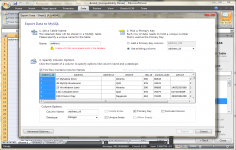 MySQL 5.6.24
MySQL 5.6.24
MySQL AB - ( Open Source)
MySQL is a successful open source database used in most web applications, e-commerce and online transaction processing.
MySQL is one of the world's most famous and used open source database. The software can be used to manage web applications, e-commerce and online transaction processing since MySQL database incorporates support those transactions. It is also commonly associated with PHP when it comes to managing websites.
With standard JDBC , ODBC, and Net, the developer can choose the programming language. MySQL has the advantage of working with almost all the popular operating systems and communicate easily with programming languages ​​such as C, C + +, VB, C #, PHP, Python, Ruby, Java, Perl, Eiffel, etc.MySQL replication allows you to create profitable applications. In addition, it enables the development of typologies replication complex and massive chain.Its reliability and robustness, performance, ease of use makes MySQL have more success than anticipated.
- Title:
- MySQL 5.6.24
- File Size:
- 44.7 MB
- Requirements:
- Windows 9x / 2000 / XP / Vista / Windows7 / Windows8
- Language:
- en-us
- License:
- Open Source
- Date Added:
- 08 Apr 2015
- Publisher:
- MySQL AB
- Homepage:
- http://www.mysql.com
- MD5 Checksum:
- 16DE431B5BF5CBD07241884290B2278F
# Bugs Fixed
- InnoDB: A TRUNCATE TABLE operation on a temporary table raised an assertion. The temporary table object was incompletely constructed when reloaded from SYS_TABLES.
- InnoDB: A full-text phrase search returned an incorrect result. An empty string was handled incorrectly when tokenizing a newly inserted row.
- InnoDB: Optimizing a FULLTEXT index raised an assertion. The last optimized word of a FULLTEXT index is stored in the CONFIG table value column which is defined as CHAR(50). An assertion was raised when the last optimized word was greater than 50 characters in length. The CONFIG table value column is defined as CHAR(200) as of MySQL 5.6.24 and MySQL 5.7.6.
- If your innodb_ft_max_token_size setting is greater than 50, it is recommended that you recreate existing InnoDB FULLTEXT indexes after upgrading to MySQL 5.6.24 or MySQL 5.7.6 to avoid this issue. FULLTEXT indexes created after upgrading to MySQL 5.6.24 or MySQL 5.7.6 are unaffected.
- InnoDB: An InnoDB memcached extra_col_value[] array was freed without checking the allocated flag, causing a server exit.
- InnoDB: A DML operation performed while a flushing operation was in progress raised a memcached-related assertion.
- InnoDB: The memcached process_arithmetic_command raised an assertion. The wrong error code was returned for a nonexistent decr key.
- InnoDB: The expiration time (exptime) defined using the memcached set command was ignored. InnoDB memcached set the expiration time to an interval value instead of a system time value.
- InnoDB: An assertion was raised when the full-text search fts_savepoint_release() function released a named transaction savepoint and all subsequent savepoints. Only the initial savepoint should be released.
- InnoDB: A full-text search optimization operation raised an assertion.
- InnoDB: Due to a regression introduced in MySQL 5.6.20, mysqld stop did not stop the mysqld server process while the InnoDB memcached plugin was active.
- InnoDB: An ALTER TABLE ... RENAME failure on a table with a FULLTEXT index raised an assertion.
- InnoDB: A severe error occurred during the log apply phase of an online ALTER TABLE operation that was converting a table with a UTF-8 charset to ROW_FORMAT=REDUNDANT.
- InnoDB: When dummy tables are created, the autoinc_mutex member of the of the dict_table_t object was created unnecessarily. Similarly, the zip_pad.mutex object of dict_index_t object was created unnecessarily for dummy indexes. To avoid unnecessary mutex contention, autoinc_mutex and zip_pad.mutex objects are now allocated and initialized on the first lock attempt.
- InnoDB: An ALTER TABLE ... RENAME operation raised an invalid assertion. The assertion code used an incorrect transaction object.
- InnoDB: A memcached append operation on an INT column caused a segmentation fault. append operations on INT columns are not supported and are now blocked.
- Partitioning: A number of ALTER TABLE statements that attempted to add partitions, columns, or indexes to a partitioned table while a write lock was in effect for this table were not handled correctly.
- Partitioning: Executing an ALTER TABLE on a partitioned table on which a write lock was in effect could cause subsequent SQL statements on this table to fail.
- Replication: When replicating from a 5.7.6 or later server to a 5.6.23 or earlier server, if the older version applier thread encountered an Anonymous_gtid_log_event it caused an assert. The fix ensures that these new log events added in MySQL 5.7.6 and later do not cause this problem with 5.6.24 and later slaves. If gtid_mode is OFF and the applier thread encounters a Gtid_log_event, the applier thread aborts with an error. If gtid_mode is ON and the applier thread encounters a Anonymous_gtid_log_event, the applier thread aborts with an error.
- Replication: When the automatic_sp_privileges variable is set, the server automatically grants the EXECUTE and ALTER ROUTINE privileges to the creator of a stored routine, if the user does not already have these privileges. When a privileged user creates a procedure with DEFINER as a non privileged user on a master, the current user is considered to be a privileged user and the mysql.procs_priv table is not updated. When such a statement was replicated to slave, the non-privileged DEFINER was considered as the current user on the slave and privileges were being allocated. This caused a difference in the privileges that were being allocated on the master and the slave. The fix ensures that creater of the stored routine is added to the binary log, and the slave now checks first if the user exists before granting privileges. To maintain compatibility with previous versions, the DEFINER is used when the INVOKER is not available. As part of this fix, anonymous users can be used to replicate from master to slave.
- Replication: When using a slave configured to use a special character set such as UTF-16, UTF-32, or UCS-2, the receiver (I/O) thread failed to connect. The fix ensures that in such a situation, if a slave's character set is not supported then default to using the latin1 character set.
- Replication: When gtid_mode=ON and slave_net_timeout was set to a low value, the slave I/O thread could appear to hang. This was due to the slave heartbeat not being sent regularly enough when the dump thread found many events that could be skipped. The fix ensures that the heartbeat is sent correctly in such a situation.
- CMake failed to detect the OpenSSL version properly for recent versions of OpenSSL (the format of the version string changed).
- For execution of prepared statements, no check was made whether an audit log plugin returned an error, so statement success could erroneously be returned.
- Debian packages were missing some dependencies.
- Corrections were made for a number of code issues that resulted in compiler warnings about array bounds, possibly uninitialized variables, and variables being set but not used.
- Following execution of a GRANT ... WITH GRANT OPTION statement, execution of a prepared statement with a view could cause a server exit.
- NULL as an expression was not recognized as a literal for calculation of Performance Schema statement digests.
- A user with a name of event_scheduler could view the Event Scheduler process list without the PROCESS privilege.
- Trying to create a user after dropping columns from the mysql.user table could result in a server exit.
- Ordering by a GROUP_CONCAT() result could cause a server exit.
- A malformed mysql.proc table row could result in a server exit for DROP DATABASE of the database associated with the proc row.
- SHOW GRANTS after connecting using a proxy user could display the password hash of the proxied user.
- Large values of the transaction_prealloc_size system variable could cause the server to allocate excessive amounts of memory. The maximum value has been adjusted down to 128K. A similar change was made for transaction_alloc_block_size. Transactions can still allocate more than 128K if necessary; this change reduces the amount that can be preallocated, as well as the maximum size of the incremental allocation blocks.
- Certain queries on the INFORMATION_SCHEMA.INNODB_FT_CONFIG table could cause a server exit.
- A server exit could occur for queries that compared two rows using the <=> operator and the rows belonged to different character sets.
- Certain InnoDB errors caused stored function and trigger condition handlers to be ignored.
- The optimizer could raise an assertion due to incorrectly associating an incorrect field with a temporary table.
- Audit log filtering was not applied to connection events.
- With audit_log_connection_policy=ERRORS, successful COM_QUIT events were errroneously written to the audit log.
- The value of the Audit_log_events status variable did not equal the sum of the other audit log counters.
- The Audit_log_events_filtered status variable did not increment when audit log events were filtered.
- Many new features were added to the audit log plugin in MySQL 5.6.20, but the version number was not increased. The version has been bumped to 1.1.
- The server could exit due to an optimizer failure to allocate enough memory for resolving outer references.
- If the audit log file was found to be corrupt at server startup, an appropriate error message was not always written. Also, if the plugin is loaded, it will be initialized regardless of whether the log was corrupt, except in the case that renaming the log file fails.
- Creating a FEDERATED table with an AUTO_INCREMENT column using a LIKE clause results in a server exit.
- The group_concat_max_len system variable could be set to its maximum value at runtime, but not in an option file.
- A server warning error message referred to the obsolete table_cache system variable rather than to table_open_cache. Thanks to Daniël van Eeden for the patch to fix some of the instances.
- In the DIGEST_TEXT column of Performance Schema statement events tables, references to system variables of the form @@var_name were stored as @ @ var_name.
- If the WITH_SSL CMake option was specified with an incorrect path to the SSL installation or the path to an unsupported (too old) SSL installation, the option was implicitly changed to the bundled value and yaSSL was used instead. Now CMake exits with an error so the user knows that the option value must be changed.
- mysql_real_connect() could close a file descriptor twice if the server was not running.
- Notification of events for the general log were received by the audit log plugin only of the general query log was enabled. Now notifications are posted regardless of whether the general query log is enabled.
Related software
2.1/5 from 178 users


